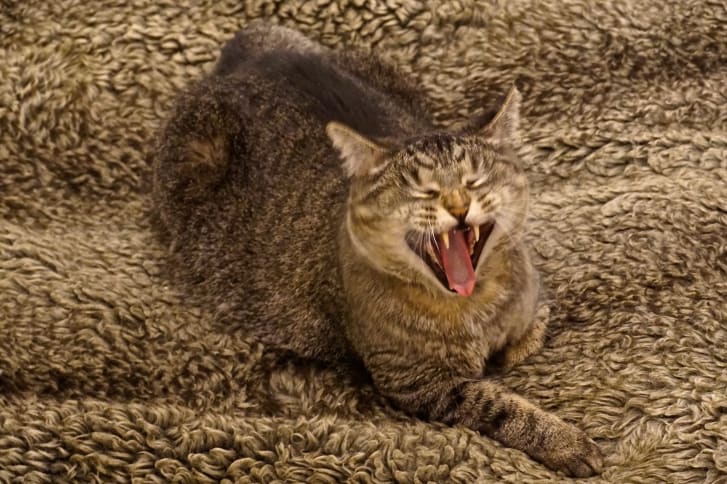 If your cat has ever urinated outside of the litter box, you remember it.
If your cat has ever urinated outside of the litter box, you remember it.
You remember the frustration and disgust, and the failed attempts and trying to put an end to it. I have shared a home with several cats who for one reason or another chose to urinate outside their designated boxes. This is my story.
Before you can stop a behavior. You have to know what causes it. Cats, like people, adapt their behavior to their surroundings. In this case, outside factors and experience can have an effect on litter box habits in cats. So, if a cat who previously didn’t have any problems using the litter box stops doing so, it is often an indicator that something is wrong. Health issues, stress, age, territory and of course litter box maintenance are some common factors. So I started by looking at each of the following:
Health
Cats can get urinary tract infections just like people do. They are extremely uncomfortable and make urinating very painful. Many cats associate the pain of the UTI with the litter box and will attempt to avoid the pain by avoiding the box. A trip to the vet and a dose of antibiotics will clear this up. My cats didn’t have a UTI or other health issue causing them to “think outside the box”.
Declawing
Another common problem is declawing, a seemingly unrelated problem that causes many cats to urinate inappropriately. During the declawing process the first knuckle of each toe is removed in order to remove the claw. It is a very painful and damaging process that can make it difficult for the cat to bury its waste. This causes stress and the stress causes the cat to urinate inappropriately. A softer, less abrasive and easier to move litter can help in some cases. This was the solution for one of my cats. She had been declawed years before I got her and the pain in her paws caused by the big gravel pieces in our original litter caused her problems. She started using her box again once we bought a softer, more finely ground litter (yay!).
 Stress
Stress
Stress from a change of environment can cause cats to express their anxiety in the wrong ways. Imagine when you leave for a few weeks and a stranger keeps showing up to feed them or when a new person is added to the family and changes the routine. Usually problems like this go away quickly once the cat becomes comfortable again. This hadn’t happened in my case, but if it had, I could’ve tried Feliway or Rescue Remedy to help reduce stress and maybe that would help.
Age
Cats over the age of 11 are considered to be seniors. They can develop stiffness in their limbs or arthritis which can make it harder to climb into litter boxes with high sides or up flights of stairs. They can also have trouble holding their urine as they age. Easy solutions include additional litter boxes or boxes that are more easily accessible, easier to enter, and better located. This also wasn’t an issue for my peeing cats, so on to the next!
Territory
Cats are territorial, so if a new cat enters what they consider to be THEIR territory they might react by urinating outside the litter box. This should not be confused with spraying, which male cats do to mark territory. This is often encountered when a new kitten is brought into the home of an adult cat. Usually the offending cat will stop once he or she becomes comfortable with the new addition.
Litter box maintenance
Litter boxes should always be maintained. Think of a dirty litter box like your own dirty bathroom. If you walked in and saw urine and feces floating in all the toilets and toilet paper lying about, would you want to use it? HECK no! Litter boxes should be scooped at least once a day, or as often as possible. Making this part of your daily routine can be helpful if you’re the forgetful type. You should also wash the box with hot soapy water each week when you change the litter. Boxes should be replaced regularly. The scratches that accumulate in the bottom can trap debris and cause unpleasant odor. If you don’t want to scoop the box every day there are self-cleaning boxes available. But be warned they can be loud and frighten a timid cat, or wake you up late at night.
After ruling out the above, it became a race against my cat’s bladder to figure out why she was still choosing to pee behind my television instead of in her perfectly clean litter box! I think I’ve tried every “fix” known to man, with varying results.
 Orange peels
Orange peels
An old coworker of mine suggested placing orange peels on areas I wanted to discourage the cats from using as a toilet. I peeled an orange and placed peels in corners and behind the television. The theory behind this is that oranges give off an intense smell that will be too much for the cat. My house smelled wonderfully like citrus…and urine. One cat peed directly on the orange peels! Another did avoid them, but promptly found another spot to pee.
Litter box location
I moved the litter boxes so they were located in less trafficked quieter areas. I even tried moving them to cover areas previously used by my cat’s inappropriate behavior. The theory on this is that if the cat was traumatized or frightened by something in or around the litter box they might avoid it in hopes of avoiding what scared them. Or that perhaps it was too loud around the box for the cat to feel comfortable. I didn’t notice any changes.
Extra litter boxes
Since moving them didn’t work, I instead added several extra around my apartment. At one point I had two litter boxes in each bedroom, two in the living room and one in a closet. The space became cramped, I didn’t invite anyone over for over a month…and I still found a puddle behind the television.
Litter box size and shape
I tried various sizes and shapes of boxes. Some with and some without lids. Personally I like high sides and/or a lid because it kept more of the litter inside the box, but not all the cats agreed and it didn’t seem to fix the problem. My only observation was that litter boxes aren’t cheap anymore and the bigger the better.
 Different litters
Different litters
I tried original, unscented litter and then scented. Clay, newspaper and something that promised to solve the problem. Nothing changed and that company still owes me a refund!
Medication
This was my last option with one cat. After years of trying the above mentioned solutions and becoming experienced enough that I felt I could probably open my own carpet cleaning business, I decided it was time for a new approach.
My veterinarian suggested putting my cat on medication to lower the anxiety we assumed she must be having. I agreed and after a few weeks she stopped peeing outside the litter box! … And she didn’t pee on the floor again for over a year. I almost cried with happiness. However, just because it worked for us I only suggest medication as a last resort after all other options have been exhausted. In our case her medication had to be discontinued after we discovered it could aggravate her heart condition.
So, she’s back to thinking outside the box, and I’m looking for natural, heart-friendly ways to reduce her anxiety. And mine.




